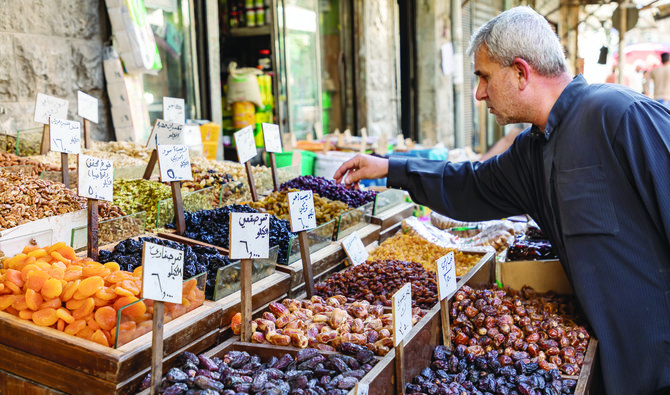Raed Omari
JORDAN: Life returned to normal a few days before Ramadan when the Jordanian government eased the COVID-19 lockdown after nearly two years of restrictions.
To curb the spread of coronavirus — which took the lives of almost 14,000 Jordanians — the government imposed a lockdown that led to curfews and the closure of businesses, limiting the mobility of people.
People continue to wear masks as a precaution — however it is not mandatory to do so in open spaces. Stadiums, wedding halls, cafes, restaurants, Ramadan tents and iftar banquets are running at full capacity during iftar and sahoor.
Worshippers now stand shoulder-to-shoulder to offer prayers in mosques and churches.
“This is how mosques should be in Ramadan and this how we should pray, and anything other than that is abnormal,” said Abdulatif Al-Jarrah, comparing the Ramadan rituals of 2020 and 2021 with 2022.
As Ramadan 2020 coincided with the height of the coronavirus pandemic, Jordan completely closed mosques even for the five basic prayers, let alone Itikaf, where people go into seclusion to pray during the last 10 days of Ramadan.
With calls growing to ease some COVID-19 restrictions during Ramadan two years ago, the Jordanian authorities responded at the time by allowing people to walk and go for Fajr and Maghrib prayers in mosques for only 30 minutes.
“Ramadan in 2020 and 2021 was sad. I have never, ever experienced that sadness before, and not only because we were not allowed to pray at mosques but also because I was unable to invite my sons and daughters to iftar,” said 70-year-old Al-Jarrah.
Organizing big iftar feasts was not allowed in 2020 and 2021, and it remained almost impossible even after the easing some of the lockdown restrictions.
The easing of COVID-19 restrictions was not only a relief for worshippers but also for business owners, who are hopeful that this Ramadan and the summer season may bring some recovery for their hard-hit businesses.
Wedding venue owner Mohammad Bashaireh said that his business was closed for two years due to restrictions, incurring “big financial losses” that he hopes to make up for this summer season.
“I had to close my wedding venue for two years but at the same time I was paying the rent of the property, and I was unable to lay off my employees and had to pay them their salaries under the defense orders,” he told Arab News.
Under the sixth defense order, which has been in effect since April 2020, companies are unable to lay off employees but instead can lower their salaries according to rules outlined by Jordan’s Social Security Corporation.
“The decision to allow large gatherings and cancel the capacity limit has really brought back the spirit of Ramadan,” said Sufyan Dweiri, who organizes Ramadan tents in Irbid, some 80 km north of Amman.
“Ramadan is solidarity and bringing together people. This spirit was missing during the past two years,” Dweiri said.
Amer Badran, the owner of a cafe in Amman, also expressed relief about the removal of COVID-19 restrictions, expressing hopes that Ramadan and the summer season would help his business to recover.
“In addition to the positive economic impact, removing restrictions has brought back the spirit of Ramadan … People staying out until dawn at mosques, cafes, restaurants,” he said.






















